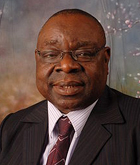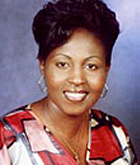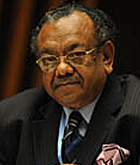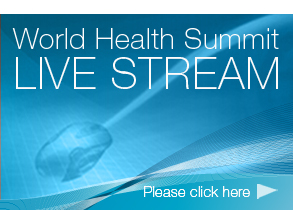Head
Newsletter No. 8
Berlin, October 20th, 2011
Headline
Summit 2011
World Health Summit 2011 | October 23rd-26th, 2011 | Berlin, Germany


Last Minute Reg
Last Minute Registration online or onsite at the registration desk!
Speaker Update
Speaker Update
Confirmed Speakers



Dr. Joseph Yieleh Chireh is a Ghanaian pharmacist, lawyer, diplomat and politician. He is a Member of Parliament for the National Democratic Congress (NDC) and Minister of Health. Dr. Chireh joined the NDC in 1992 and when he was appointed as Upper West Regional Minister by former President Jerry Rawlings. Furthermore, between 1997 and 2001 he was made the Ambassador to Algeria, Tunisia and Mauretania. He contested the newly created Wa West constituency seat in the Ghanaian parliamentary election in December 2004, which he won leading to his seat in Ghana’s Fourth Republic Parliament. He retained his seat in the 2008 parliamentary elections. In February 2009, he was appointed Minister for Local Government and Rural Development by the new President of Ghana, John Atta Mills (NDC). Finally, due to a cabinet shuffle he was appointed Minister of Health in January 2011.
Joseph Yieleh Chireh will speak at the following sessions:
Working Session
The Global Health Workforce Crisis: An Unfinished Agenda
24.10.2011
12.00-13.30
Working Session
Social Health Protection Systems and HIV: Developing Fair and Sustainable Financing Structures for a New Chronic Disease in Low- and Middle-Income Countries
25.10.2011
12.00-13.30
bell
Violet Otindo is a young Kenyan television reporter and producer for K24 Television. In 2009, she has won the CNN/Multi choice African Journalist of the Year Award for a news story about a slum in Nairobi. Since then she has become an influential high profile journalist that has given a voice to those that normally remain unheard. She started out as a producer and continuity announcer with Sauti Ya Rehema Radio and TV in 1999 joining Jesus Is Alive Media Productions in 2001 as Head of Production. During this time she produced a documentary about AIDS for UNICEF Kenya. In 2006 she joined Endemol East Africa as a camera operator on Kenya's first reality TV show. She currently produces and directs a weekly show, Nairobi Matters, for K24 TV and has a Diploma in Mass Communication.
Violet Otindo will speak at the following session:
Pre-Panel invitation only session
The Crucial Role of Media in Health Promotion
Wednesday, October 26th, 2011
12.00-13.30
Prof. Dr. Ruhal Haque is a renowned orthopedic surgeon, Member of Parliament and the Minister of Health and Family Welfare in the Government of the People's Republic of Bangladesh. He is a fellow from the Royal College of Surgeons in the UK and the International College of Surgeons in the USA and began his career in Bangladesh in 1968 after graduating from the Dhaka Medical College. As associate professor and then professor he served in various medical colleges, hospitals and trauma centers in both Great Britain and Bangladesh. A member of several national and international social and health service organizations, Prof. Haque has presented papers at home and abroad, and has had his research published in national and international journals.
Ruhal Haque will speak at the following session:
Keynote Lecture
Monday, October 24th, 2011
15.45-16.45
Program Highlights
Program Highlights
Panel Discussion and Partner Symposia
Strengthening National Governance of Research for Health in LMIC
The Social Responsibility of Academic Health Centres
Austerity Measures and Health Care: Fiscal Discipline vs. Investing in Health



M8 Symposium on Oct. 23rd,
15.00-16.30
The symposium will focus on national research for health as a driver for development in low- and middle income countries. In general, the health research agenda is still dominated by donor countries and the global health initiatives. This situation has profound long-term effects on research and innovation capacity because socioeconomic transformation of many countries will not be achieved without increased investment in science, technology and innovation.
The capacity to conduct research in the health sector as well as in other sectors is a critical part of the development process. To catalyze this process, it is inalienable for countries to invest in health research, to strengthen its governance, to set research priorities, to have predictable and sustainable core funding and to improve the research landscape with better job opportunities for researchers. This session brings together experts from research, policy and practice to discuss country examples and options for strengthening health research. Inputs and discussions will center on research governance, the role of research institutions, priority setting on the national and the global level, commercial interests and the role of the private sector. The symposium will also look into the implications for development cooperation and for South-North and South-South research partnerships.
Chairs:
Stefan N. Willich | Director | Institute for Epidemiology, Social Medicine and Health Economics, Charité | Germany
Carel Ijsselmuiden | Director | Council on Health Research for Development (COHRED) and the Global Forum for Health Research | Switzerland
Speakers:
Mario H. Rodríguez | Director | Instituto Nacional de Salud Pública | Mexico
Hassan Mshinda | Director General | Tanzanian Commission for Science and Technology (COSTECH) | Tanzania, United Republic of
Sue Kinn | Department for International Development (DFID) | United Kingdom
Tikki Pang | Director of Research Policy and Cooperation | World Health Organization | Switzerland
M8 Symposium on Oct. 23rd,
16.45-18.15
This session will focus on how academic health centres can integrate their basic activities of education, research, and patient care with improving the health of the populations they serve. The program will discuss the restructuring of health professions education to meet changing societal needs, the linking of research to improved health outcomes, and the transformation of patient care based on well defined population needs and priorities.
Chairs:
Steven Wartman | President and CEO | Association of Academic Health Centres International | United States
Edward Hillhouse | Chief Policy Advisor on Academic Health Systems | Hamad Medical Corporation | Qatar
Speakers:
Shunichi Fukuhara | Director, Department of Epidemiology and Healthcare Research | Kyoto University School of Medicine and Public Health | Japan
Louise Gunning | President | Health Council of the Netherlands | Netherlands
Lokman Saim | Dean and Director | UKM Medical Centre | Malaysia
Nelson Sewankambo | Principal, College of Health Science, CIGIs; Director, African Initiatives | Makerere University | Uganda
Sarita Verma | Deputy Dean, Faculty of Medicine and Associate Vice Provost, Health Professions Education | University of Toronto | Canada
Partner Symposium on Oct. 24th,
14.00-15.30
For its 2010 Health Minister Meeting, the OECD met with the health ministers to discuss "Health priorities when money is tight". Policy makers are now under tremendous pressure to achieve macro-economic stability and are looking at all public spending for potential savings and cuts. At the same time, applying short-term budget restrictions to healthcare spending could have a disastrous middle to long-term impact on population welfare and potential economic growth.
The key question is thus, how to ensure that our healthcare expenditures correspond with our healthcare priorities, provide value for money, and ensure that we continue to prolong the morbidity threshold in order to keep our ageing population healthy and active. Our panel will discuss this complex policy landscape and provide elements for responding to the following questions:
- How to control public spending in the short-term while supporting our long-term goals for equitable, responsive, effective and efficient health systems?
- How strong is the case for sustainable spending in healthcare to achieve long-term economic growth?
- What are the different dimensions of "value for money" in healthcare from straight budget cuts to adoption of more efficient methods of care and technologies?
Chair:
Melinda Crane | Journalist | Deutsche Welle | Germany
Panel:
Bruno Strigini | President of Europe/Canada | MSD | United Kingdom
Wolfgang Greiner | Health Economist | University Bielefeld | Germany
Michael Schoenstein | Economist | OECD | Germany
Dieter Möhler | President | German Diabetes Association | Germany
Frank Lichtenberg | Health Economist | Columbia University New York | United States
Boris Azais | Director Policy Affairs | MSD | France
Webstreams
Main Sessions live online!
World Health Summit Live Streams can be watched online in section "Press & Media".

Network
Network
African Comprehensive HIV/AIDS Partnerships (ACHAP)
Deep Dive „Lessons Learned from ACHAP: How Partnership Turned the Tide on HIV/AIDS in Botswana“on October 24th, 14.15-15.30.
In 2000, in response to one of the greatest health challenges of our time, in a country disproportionately affected by HIV/AIDS, the government of Botswana, The Merck Company Foundation/Merck and the Bill & Melinda Gates Foundation established the African Comprehensive HIV/AIDS Partnerships (ACHAP).
ACHAP's mission is to support and enhance Botswana's response to the HIV/AIDS epidemic through a comprehensive approach that includes HIV/AIDS prevention, treatment, care and support, and impact mitigation. In 2007, ACHAP expanded its support to target co-infection of HIV and tuberculosis (TB). HIV infection has fueled an explosive increase in TB cases in Botswana since the early 1990s. In fact, it is estimated that 65-85 percent of TB patients are HIV positive, and HIV-related TB is the leading cause of death among adult AIDS patients.
One of the strengths of ACHAP has been its full integration with government strategy, as well as its ability to harness private-sector expertise in support of national efforts to address HIV/AIDS. All ACHAP programs are developed through extensive consultation with all relevant government ministries. The partners selected Botswana because it had one of the highest adult prevalence rates of HIV/AIDS in the world (see sidebar below), a viable existing healthcare infrastructure and strong political will and commitment to address the challenges of HIV/AIDS. When ACHAP was established in 2000, more than one in four adults was infected with HIV in Botswana–then the highest HIV prevalence rate in the world. HIV prevalence exceeded 30 percent among men and women in the 25–40 age group. More than one-third of children born to HIV-positive women became infected with the disease. The number of AIDS orphans had quadrupled in five years. Fewer than five percent of those in need of anti-retroviral (ARV) therapy were receiving it, and health facilities were overburdened: Patients who were HIV infected and in need of care occupied about 60 percent of hospital beds. There was a severe shortage of health workers and physicians, particularly those trained in the area of HIV/AIDS. Life expectancy at birth had declined by 13 years, and between 1991 and 2003, morbidity had increased four-fold among 25-44 year olds. At this rate, the total population of the country was expected to be reduced by 18 percent, while the Gross Domestic Product was projected to decline 4.5 percent annually, resulting in an economy 30 percent smaller than it would have been without the impact of AIDS.
From the beginning, Merck and the Gates Foundation sought to create a program that would leverage private-sector management expertise to resolve social and public health issues. They also hoped to create a pilot program, which, if successful, could serve as a model to inform and encourage others in government, international organizations, foundations and the private sector working to address HIV/AIDS in other countries or regions.
Lessons Learned in Botswana
- A successful national response to HIV/AIDS requires sound, enabling policy to drive and guide the right course of action;
- Local, national and international partners must integrate and align all efforts to the National blueprint
- Success depends on building local capacity and achieving buy-in at all levels
- It is possible to implement effective antiretroviral therapy, even in a resource-limited setting
- A sustainable solution must address both treatment and prevention
- ACHAP is considered an important model to address the African HIV epidemic and lessons learned can be leveraged to inform positive action in other countries in the region
- Working collaboratively and in a complimentary fashion with other development partners has enabled the expansion and strengthening of key programs
Looking Ahead
While much progress has been made in Botswana, particularly in the area of treatment, expansion of HIV counseling and testing services (HCT) and in improving ACHAP's institutional capacity to deliver effectively on its strategic objectives, much still needs to be done as part of a comprehensive, sustainable and successful response to the AIDS pandemic in that country. It is becoming increasingly apparent that if Botswana is to get ahead of this epidemic, the focus needs to be on prevention.
A Deep Dive Session „Lessons Learned from ACHAP: How Partnership Turned the Tide on HIV/AIDS in Botswana“ will take place at the World Health Summit on October 24th, 14.15-15.30.
Satellite Meeting
Satellite Meeting
Stakeholder Meeting on Strengthening Research Partnerships for Neglected Diseases of Poverty, Maternal, Newborn and Child Health
Meeting on October 21st-22nd, 2011 (by invitation only)
Partner Symposium “Strengthening Research Partnerships for Neglected Diseases of Poverty and Maternal Newborn and Child Health” about the final outcomes on October 23rd, 16.45-18.15
The stakeholder meeting is a satellite meeting, which is designed to provide essential input to the World Health Summit 2011. The goal is to build awareness among politicians, senior policy-makers and health experts from the public and private sector on the necessity to invest more in health research on diseases of poverty.
The meeting will build on the “Berlin Action Framework” which resulted from the first stakeholders meeting in 2009 and its continued potential to strengthen research partnerships on neglected diseases of poverty through advancing the key principles of: (i) developing country-led engagement in health research on issue that affect them; and (ii) equitable and fair North-South, South-North and South-South partnerships backed by fair contracting processes. The meeting will be convened jointly by UNICEF and TDR (Special Programme for Research and Training in Tropical Diseases) that helps coordinate, support and influence global efforts to combat major diseases of the poor and disadvantaged. TDR, which is co-sponsored by UNICEF, UNDP, the World Bank and the WHO, has recently won the 2011 Gates Award for Global Health. Moreover, together with UNICEF it has envisioned several projects concerning the improvement of research activities in the mother and child health realm. The German partners that will be consulted in the course of the agenda setting process are GIZ, Federal Ministry of Economic Cooperation and Development (BMZ), Federal Ministry of Education and Research (BMBF) and the Secretariat of the World Health Summit. Participation will be by invitation only and will be limited to 40 high level policy-makers and health researchers representing governments from across the globe - with a focus on representatives from countries of the global south - and selected senior members of health research organizations and networks. The meeting will try to identify mechanisms to maximize coherence among partners as well as priority implementation research areas. It is intended to strengthen networks and foster links between academia and ministries of health, science and technology, education and finance for sharing information on research activities and highlight the value of implementation research and the application of its outputs in public health.
In addition, a partner symposium at the summit of WHO, TDR, UNICEF and GIZ on behalf of the BMZ will present the final outcomes of the meeting and point out recommendations for the future:
Partner Symposium Strengthening Research Partnerships for Neglected Diseases of Poverty and Maternal Newborn and Child Health 23.10.2011 16.45-18.15
Program
Publication
Book of Proceedings 2010
Click here to download the Book of Proceedings from the previous World Health Summit in 2010.
Social media
Contact
Contact
Contact
Summit Secretariat
Charité - Universitätsmedizin Berlin
Charitéplatz
110117 Berlin, Germany
Tel.: +49 30 450 572 117
Mail: secretariat(at)worldhealthsummit.org
Contact
Organizing Office
c/o K.I.T Group GmbH
Association & Conference Management Group
Kurfürstendamm 71, 10709 Berlin, Germany
Tel.: +49 30 246 03 240
Mail: registration(at)worldhealthsummit.org
